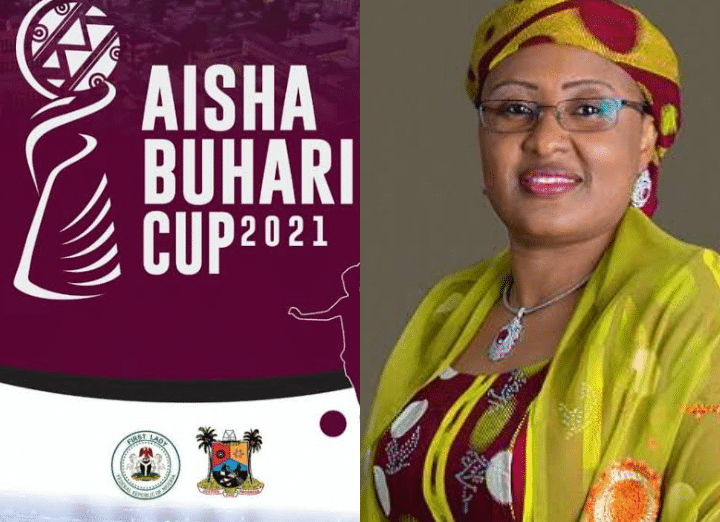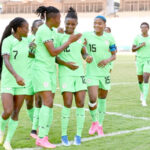In a 4-2 victory against Nigeria’s Super Falcons, the Bayana Bayana of South Africa won the recently concluded maiden edition of the six-nation Aisha Buhari Women’s Invitational Football Tournament at the Mobolaji Johnson Stadium at Onikan in Lagos.
The Nigerian side endured a tough first-half as the South Africans scored three first-half goals. From the start of the second half, the Super Falcons fought back as substitute Ikechukwu Vivian clawed two goals back to keep them in contention. The hope of the Falcons winning the game was however thwarted when the South Africans added a fourth goal from the penalty spot a few minutes to the final whistle. Nigeria, South Africa, Cameroon, Ghana, Mali and Morocco all participated in the tournament.
The tournament, which had the theme ‘Playing for Good’, took place from September 13 to 21, 2021. Chairman of the Local Organising Committee for the tournament, Barr. Seyi Akinwunmi, said the theme evolved from a vision that reflects Mrs Buhari’s concern for creating opportunities for the girl-child in terms of education, sports and economic independence.
Nigeria’s First Lady and wife of President Buhari, Aisha Buhari, said the football competition was organised to promote football among women and the girl-child for greater opportunities ahead. Speaking at a reception organised in Lagos by business mogul Aliko Dangote in honour of the visiting FIFA President, Gianni Infantino, Mrs Buhari, who was represented at the occasion by the wife of Lagos State governor, Mrs Ibijoke Sanwo-Olu, said “Our objective for this tournament is to use the event to promote women football and highlight its critical linkage to women development and the challenges facing women and girl-child, not only in Nigeria but on the African continent”.
She also drew the attention of policy-makers to the need to address the growth and development of the girl-child in Africa. We commend the First Lady for the initiative and call for its sustainability beyond the life of this administration.
We believe, however, that there is something more germane than all the sporting benefits availed by the tournament. One is the great opportunity it created for the young African girls to come together and interact with their counterparts from across the continent. Comparatively, the African woman has limited intra-African opportunities where she is exclusively exposed to women from other African societies and cultures. Such opportunities promote regional integration, social cohesion, and mutual understanding within Africa.
Beyond the girl child and women, Africans need more formal and informal channels of integration. Africans, uniquely in the world, have limited understanding of the cultures and traditions of other Africans. They also do not know much about the continent, partly because Africans depend largely on international media like the BBC, VOA, Radio France, and so on, for information about their own neighbours, African peoples also mostly meet with one another in the cities and capitals of Western countries.
One consequence of this development, therefore, is that many young Africans are fixated with anything European or American, while at the same time have little appreciation of things African. It is regrettable that an average African prefers to go and pursue or practice his/her career as a professional football player, athlete, academic, or stage-performer in European countries than anywhere on African soil.
The African child is also not inspired to explore the opportunities in other African nations because he lacks enough knowledge to appreciate them; making him obsessed with anything foreign to Africa. This explains why we need more tournaments like the one organized by Aisha Buhari to decolonize the psyche of the African youth. But the platforms for intra-African relations of these kinds go beyond football, sports, or athletics competitions.
Education exchange programmes at regional and sub-regional levels can provide similar opportunities for young Africans to meet, share ideas and understand not only their identities better but also appreciate their cultural diversities further. Undergraduate and postgraduate scholarships and fellowships for Africans to study, live and work in other African countries should also be encouraged.
A cultural festival that will annually bring African youths together like the first Festival of Arts and Culture (FESTAC) organised by Nigeria in 1977, will further the vision and mission of the just-concluded tournament. Music and film industries on the continent should intensify collaborative film and musical projects on themes that will promote African identity, culture and sense of self.
Above all, we urge African governments and regional governmental and non-governmental organizations to take the idea of African integration more seriously. This entails more efficient regional transport infrastructure, media, businesses, and any other platforms that will ensure the integration of African youths and peoples. All these can only make Africa stronger.

 Join Daily Trust WhatsApp Community For Quick Access To News and Happenings Around You.
Join Daily Trust WhatsApp Community For Quick Access To News and Happenings Around You.


